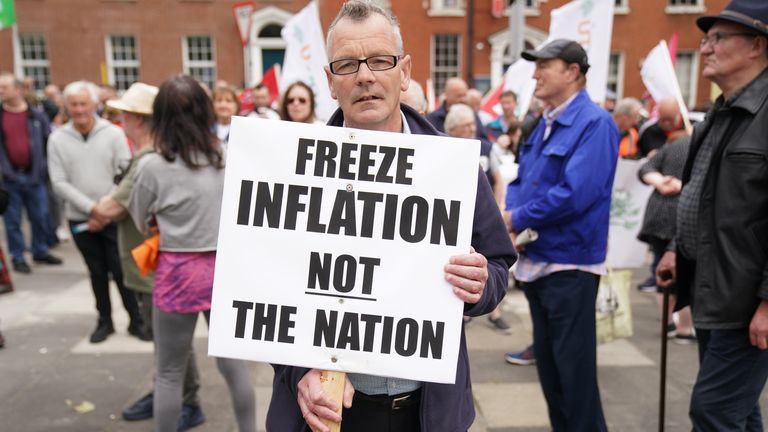Protesters in Romania used horns and drums to express their outrage at the growing expense of life. People protested in the streets across France to call for pay increases that keep up with inflation. Protests over the government’s handling of the energy crisis were held in the Czech Republic. German and British pilots participated in strikes to demand higher pay as prices rise.

Rising inflation across Europe is the cause of a wave of protests and strikes that highlight the growing unhappiness with the rising cost of living and pose a threat of igniting political unrest. The risk to political leaders increased after British Prime Minister Liz Truss was forced to quit after less than two months in office after her economic policies caused havoc in the financial markets and further hurt an already struggling economy.

The war that Russia is waging in Ukraine has caused energy costs and food prices to skyrocket for Europeans. According to the Brussels-based Bruegel think tank, even though governments have provided households and businesses with a staggering 576 billion euros (over $566 billion) in energy relief since September 2021 and natural gas prices have fallen from record highs reached during the summer, some protesters still feel that it is not enough.
Energy costs have increased inflation in the 19 nations that use the euro to a record 9.9%, making it more difficult for individuals to purchase the necessities. For some, their only option is to take to the streets.
READ ALSO: Australia Reverses Trump-Era Recognition Of West Jerusalem As Israel’s Capital
More than 100,000 people participated in protest marches this week in numerous French cities, and Rachid Ouchem, a physician, claimed that “people today are forced to employ pressure tactics in order to achieve an increase” in wages.
According to risk consulting firm Verisk Maplecroft, the consequences of the war in Ukraine have significantly increased the risk of civil upheaval in Europe. While supplying Ukraine weaponry and promising to wean their economies off of cheap Russian oil and natural gas, European leaders have enthusiastically supported Ukraine. However, the shift hasn’t been simple and threatens to erode public support.
The energy situation cannot be solved quickly, according to Verisk Maplecroft analyst Torbjorn Soltvedt. And if anything, it appears that inflation will be worse than it has been this year next year.
As a result, he said, the relationship between economic pressure and public opinion about the conflict in Ukraine “will really be tested.”
READ ALSO: Russian Warplane Crashes Near An Apartment Complex, Killing 13 People
High school teachers, rail and transport workers, and employees of public hospitals responded to a call from an oil workers’ union on Tuesday to demand pay raises and protest government interference in refinery worker strikes that have resulted in gasoline shortages in France, where inflation is running at 6.2%, the lowest rate among the 19 countries in the eurozone.
Days later, thousands of Romanians participated in a protest in Bucharest against the high cost of food, energy, and other necessities that, according to the rally’s organisers, was pushing millions of workers into poverty.
The pro-Western coalition government in the Czech Republic was called to resign by sizable crowds waving flags in Prague last month after it was revealed that the EU had supported sanctions against Russia. They also criticised the government for not doing enough to assist people and businesses who are struggling with rising energy prices.




















